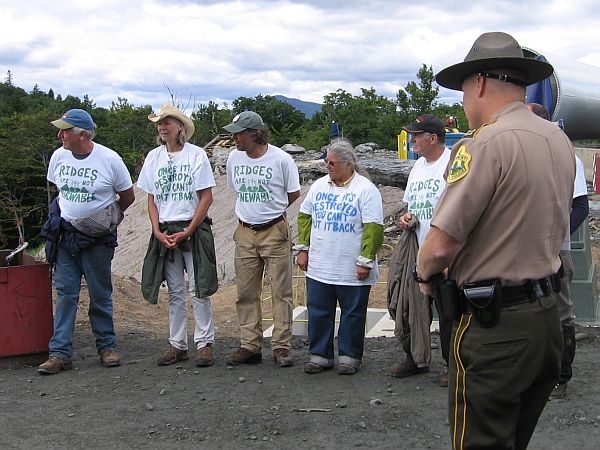Compare 6 arrested of about 25 demonstrators against Green Mountain Power’s wind energy project on Lowell Mountain vs. 130 arrested of a thousand protesting in March against the Vermont Yankee nuclear plant.
Also notice what they were protesting. The location on Lowell Mountain, as damaging the mountain top and being unsightly, plus:
“I feel like they [GMP] only went through the public process to a point, and the process is flawed,” said Young, a self-employed logger and farmer from Westfield. “Community members don’t have the resources to have a strong voice. It’s complex, expensive, and lawyers don’t want to do it.”
At Vermont Yankee, the protests were against radioactive leaks, nuclear waste, and this:
Yankee’s initial 40-year license expired Wednesday. The plant is still running, under a 20-year extension from the federal Nuclear Regulatory Commission—despite a vote by the state senate not to allow the plant to continue operating in Vermont.
 A common theme is lack of democratic oversight, although even that seems greater in degree for Vermont Yankee. We are familiar with that issue in Georgia, where there’s an election going on for Public Service Commissioners and legislators.
A common theme is lack of democratic oversight, although even that seems greater in degree for Vermont Yankee. We are familiar with that issue in Georgia, where there’s an election going on for Public Service Commissioners and legislators.
Another common theme is that it’s complex and expensive, which is indeed an issue for big wind projects. Power companies like them as big as they can build them because that fits their corporate bureaucracy. They can instead be smaller and distributed. Nuclear power plants, on the other hand, are always big, bureaucratic, and expensive.
While I thoroughly sympathize with the Lowell Mountain protesters about the mountain top issues, I don’t see anything about them protesting the risk of a wind spill. Risks of nuclear radioactive contamination are very real, and are among the Vermont Yankee protesters’ main issues. Wind off the coast of Georgia would not have that problem.
-jsq












